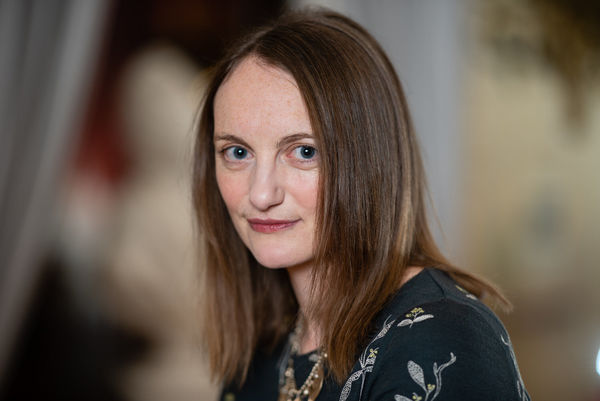
Ailbhe Darcy is a poet, a critic, and Senior Lecturer at Cardiff University, where she teaches creative writing, contemporary Irish poetry, and literature.
Her first volume of poetry, Imaginary Menagerie (Bloodaxe Books, 2011), was shortlisted for Ireland’s Strong Award. Her latest volume, Insistence, was launched at O'Connell House in June 2018 at the Keough-Naughton Institute's graduate IRISH Seminar. Also published by Bloodaxe Books, it was shortlisted for the 2018 T.S. Eliot Prize in Poetry and won Wales Book of the Year and the Piggott Prize for Poetry.
Professor Darcy received both an MFA in Creative Writing and a Ph.D. in English (with an Irish Studies graduate minor) from Notre Dame. In her year of graduation (2015), she was awarded the Notre Dame Graduate School’s highest prize—the Shaheen Award—in the humanities.
She wrote the poems in Insistence while a student at Notre Dame and after the birth of her son. They describe an intimate world, in which the words “home” and “love” dominate. The private world, however, is threatened by an exterior, public one. In an era of climate change and upheaval, Professor Darcy says, the poems take stock of the parent’s responsibility to her child, the poet’s responsibility to the reader, and the vulnerability of the person in the face of worldwide crisis.
Professor Darcy has been at home in Wales since the start of the pandemic, although she connected with a global audience in October 2020, when she was featured in New York City's Irish Art Center's 12th annual Poetry Fest.
From Cardiff, she responded to our Three Questions.
_____________________________________
What are you working on?
I think it's important to be honest about this: I'm not 'working on' anything in the pre-pandemic sense. I'm working on keeping healthy and cheerful while my son's school is closed and my teaching is online, and that's challenging enough for anybody. But David Wheatley and I are putting the finishing touches on our co-edited History of Irish Women's Poetry, which is due out with Cambridge University Press in June 2021. I can't tell you how proud I am of this volume, which has contributions from twenty-six brilliant, masterful scholars in the field and ranges from the medieval to the present day. It builds on the work of generations of feminist scholars in Ireland and in Irish Studies, who have laboured tirelessly in the face of a misogyny that has often seemed undefeatable. (They have made it possible for us to believe that it is not.) I feel sure that it will be a valuable teaching resource and a spur to further research.
Beyond that, I'm hopeful that in the spring I might have enough time and solitude to write a poem or two. I feel like I have several poems curled up inside me, waiting for the opportunity to send up green shoots.
What are you reading?
My husband gave me Alice Walker's collected essays, In Search of Our Mothers Gardens, for Christmas. These essays are nourishing, for a writer who's struggling to find the time and the means to write, because they return again and again to the idea that writing is a collaborative act—that it's only ever one small gesture in the service of a larger, shared endeavour—and that reading, teaching, child-rearing, friendship and activism can all be part of that shared endeavour, too.
I've also been reading Katrina Naomi's newest book of poems, Wild Persistence, which I'm reviewing for BODY Literature. It's a strange and subtle collection.
What, during the pandemic, are you missing?
I miss everything. Everything. I miss all the predictable things—my mum and dad, my brother and sister, whom I haven't seen for almost a year—and all sorts of unpredictable things—staff meetings, soft play centres, travel fatigue, the smell of swimming pool chlorine. I miss solitude and I miss excitement. I miss it all. I love the world dearly and I dearly want it back.
Previous installments of "Three Questions":
December 2020: Professor Daniel Carey, National University of Ireland Galway
November 2020: Professor Sonja Tiernan, University of Otago, New Zealand